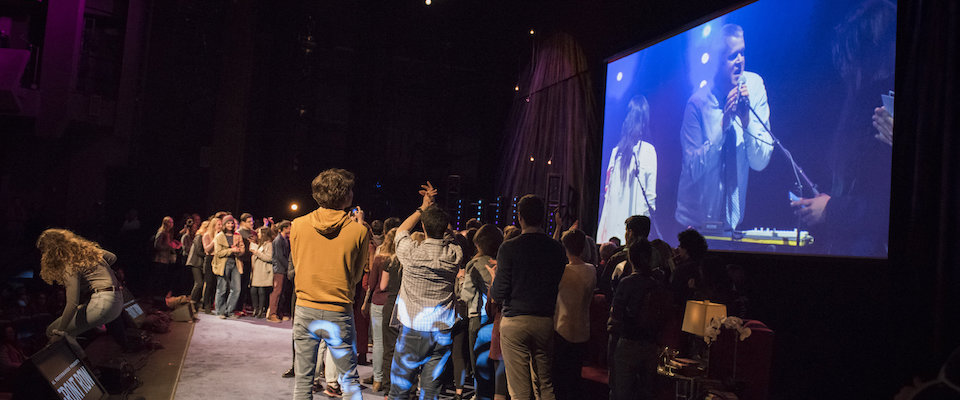Last week Daniel Handler, better known as Lemony Snicket, author of the children’s novels A Series of Unfortunate Events, now a Netflix series that was largely written in Handler’s San Francisco dining room, lead an eclectic assortment of guests—singer/songwriter Thao Nguyen, record producer John Vanderslice, perfumer Yosh Han, poet Matthew Zapruder, and, in a powerful closing discussion, Cecile Richards, president of Planned Parenthood—through an evening of music and conversation.
Handler, ever-wry and irreverent, stood center stage in a suit and tie, explaining the night’s theme.
“Big topics begin as small sparks,” he said. “We wanted to show how a small idea—a phrase, a scent, a melody, a sense of one’s body—can loom large and contribute to the larger world.”

It was the second Front Row, which is produced by a group of student curators working under the direction of Cal Performances staff. The yearly event, which will run for four years is funded by the Wallace Foundation. Cal Performances, one of 26 national arts organizations to receive a $500,000 grant, launched Front Row to inspire 18 to 26 year olds audiences to attend live events.
Last year’s inaugural show, hosted by Lars Ulrich of Metallica, ran for three hours, and centered on the theme of fatherhood. This year, Handler, who worked closely with Front Row’s 13 student participants for 10 months, kept things moving briskly for a 90-minute set. All of the guests had been vetted by Front Row student curators and Handler.
“What unifies this selection of performers is that each of these people answered a calling,” says student curator Tait Adams, a UC Berkeley senior majoring in theater arts and Front Row participant for two years. “Their careers are not necessarily rational, but they found a way to do unorthodox work and still be true to themselves.”
Front Row students, who are overseen by Cal Performances’ associate director Rob Bailis and event producer Kathy Rose, met bi-monthly in a basement conference room in Zellerbach to workshop the event.
The experience, says Adams, was very different from her theater major performance work. “In Theater Arts, we have dedicated process. We execute off a script,” she says. “Here, we are inventing the process. What you see onstage is only a small slice of our year-long experience.”
“I always think it’s a mistake to begin with a concept, so we began by thinking about a long list of interesting people…It’s much like figuring out a menu by first remembering what tastes good, although, as I had to keep reminding the students, none of the onstage guests will be devoured.”
The 13 student participants who were recruited by flyers and word of mouth and drawn from diverse fields, including business and technology, developed a wish list of 30 potential hosts, which was narrowed down to Bay Area residents who were willing to meet and mentor the students over the year. “That leads to a certain kind of collaborator,” says Bailis. Handler, who had attended last year’s event, was sought out because he “is a powerful cultural figure who has this lesser known side of being a profoundly generous public activist.”
The purpose of the program, says Roseis is “to show the students what the artistic life is like.”
In an email describing his collaboration with the group, Handler wrote, “I always think it’s a mistake to begin with a concept, so we began by thinking about a long list of interesting people. Then we began to think about how they might relate to one another over the course of an evening, and the invitations proceeded from there. It’s much like figuring out a menu by first remembering what tastes good, although, as I had to keep reminding the students, none of the onstage guests will be devoured.”
Other guests met with the Front Row team, including some that did not end up onstage. One, Isaac Amala, a cofounder of the Oakland-based nonprofit Safer DIY Spaces, met the students a week before the show to describe his group’ effort to bring alternative performance spaces up to code in the wake of Oakland’s recent deadly Ghost Ship fire.
After Amala spoke, Bailis addressed the students seated around the conference room table, some with laptops open, taking notes. Anyone pursuing a career in the arts, Bailis said, would be concerned with protecting nonprofit and cultural spaces. “There’s been a pronounced migration of artists out of San Francisco to the outer reaches of the East Bay over the last 10 years.” And one guest, record producer John Vanderslice, he added, “is an artist who has had to reimagine his business model time and again because a secure facility space was not on the table. This question of displacement has shaped his creativity and his business.”
As it turned out, Safer DIY Spaces manned an information table in Zellerbach’s lobby, which Front Row students had decked out with interactive poetry stations, a photo booth. Snacks, and nonalcoholic beverages were there for the audience to enjoy following the show.
According to Bailies, who secured the Wallace grant, the February 22 event drew 1200 attendees, a significant jump from last year’s audience of 780 students. “Front Row is about making these kids ambassadors to live arts,” says Bailis. The program seeks to increase student audiences by fostering engagement and a sense of relevance while removing barriers such as expensive ticket prices.
Nearly half of all Cal Performances audiences consist of campus faculty, staff, and alumni. Until two years ago, only 5 percent of the audience came from the student population. By discounting tickets to $5 and cultivating student engagement
“we’ve moved the needle to 8.7 percent,” says Bailis. But the long-term goal they’ve established is 12 to 15 percent of the audience total. It isn’t easy, he says, given that there has been a steady decline in arts education in K-12 public education and arts organizations are competing for students’ leisure time, with among other activities, digital devices. “it’s our responsibility to educate and create the audience of the future.”
A Series of Fortunate Mentors
Judging from the Front Row audience’s reaction to Handler the student audience clearly has a deep connection with his most beloved character. Every mention of Lemony Snicket was met with thunderous applause.
The set was the mash-up of garage band space and cozy living room, with microphones, drum kit, and electronic keyboard assembled on one side of the stage, and two sofas, a large globe, and a rolling cocktail service tray anchoring the other. Handler led people out one by one, chatting center stage with his hand-held microphone, listening from his perch on the sofa until he finally beckoned them over for an informal discussion.
He described the music of Thao Nguyen, frontwoman of the band, The Get Down Stay Down, as sounding “ like someone slapping you in the face while drinking whiskey.”
He admitted to difficulties in staying focused during poetry readings, which elicited from Matthew Zapruder an explanation,, “Poems are supposed to make you drift off into your associations. It means they’re working.”
When Handler and scent artist Yosh Han created a new perfume onstage, Han described mixing introductory top notes, sustaining middle notes, and enduring bass notes to evoke a memorable olfactory response. Her technique echoed a point Bailis had explained the prior week in a telephone interview about the art of curation. “Front Row students are learning that producing an event is more than selecting things and putting them on stage,” he said. “The real task is building the frame, making sure you’re putting together something that will have resonance and meaning in a unique and effective way.”
As the final guest, Cecile Richards, president of the Planning Parenthood Federation, provided those bass notes. She described the moment in her own life when she realized activism could be a career and not merely “a side job.” She exhorted the audience “not to wait for instructions” and “tell your story—that is the main thing that changes people’s mind.” 
With that, Handler called for a final performance, calling every guest and Front Row student back to the stage. As the band, led by Thao Nguyen, kicked into the first notes of “I Take My Body Back,” the singer/songwriter coaxed audience members to join them. The night ended with a celebratory moment of students dancing and chanting, “Why Deny?” on the crowded stage.
“It was off the charts,” Bailis marveled. “And pure Berkeley.”
Kathy Rose, Front Row’s coproducer agrees. “It’s awesome to work with kids,” she said. “You see their eyes light up, especially after the show. That’s when they see they’ve accomplished something that’s never been on their orbit. What they’ve done on this scale is extraordinary.”
Barbara Tannenbaum is a journalist and fiction writer based in San Rafael, CA. Her pieces on arts and culture have appeared in The New York Times, San Francisco Magazine, The Los Angeles Times, Daily Beast, and Salon.com.



















